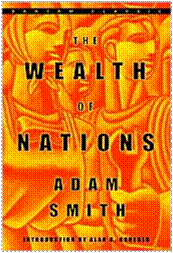December 2008
In this issue:
1. Readers’ Comments
2. Newsbits
3. December Editorial: “Hyper-Capitalism: What Ever Happened to Free Markets?”
4. Preview: Next Month’s Editorial
5. Quote of the Month – James Thurber
6. Hot Link of the Month
7. Want to Blog?
8. Click and Play of the Month
1. READERS’ COMMENTS
Thanks to New Dimension Radio’s Justine Toms for her kind words about last month’s newsletter editorial as well as Ann Roulac’s comments on last month’s blog on wilful blindness.
2. NEWSBITS
John’s December Blog
This month’s post is “Can a Cry for Fairness Bridge the Gap Across Ideologies?” Please check it out and post your comments.
John Leads Foresight Network Discussion on the Financial Crisis
In December 2007, I started a discussion forum on the Foresight Network inquiring why futurists weren’t talking more about a potential American empire collapse. It quickly became one of the more popular forums with posting by futurists from all over the world. In the last summer I deactivated it only to revive it again after the Fall economic meltdown and the conversation resumed – hot and heavy! While most discussions post entries of single digits and a few at double, our forum just surpassed 200 posts, by far the most popular discussion amongst the 1,700+ futurist-members. If you’d like to check it out go to Shaping Tomorrow and sign up.
3. DECEMBER EDITORIAL
Market fundamentalists are fond of citing Adam Smith’s “invisible hand” theories as expressed in his book The Wealth on Nations, considered by many to be the sacred text of capitalism. Of course Smith could hardly have predicted the degree to which the market would be so manipulated as it has over the century and a half since he penned his 1776 book. Political lobbying and campaign contributions in the U.S. with the resultant government subsidies, tax advantages , changes to corporate law and other tilting of the free-market scale in favor of some to the detriment of others has created a market far from the unfettered model Smith had envisioned.
But that doesn’t stop the market fundamentalists from shouting “let the market resolve things”, “keep government out of the marketplace” and labeling any attempt to bring the scales back into balance as “socialism.” What market fundamentalists do not admit or wish to have known is the market is far from free. Special interests have sought advantages over generations so that those with the most to spend can effectively purchase preferred treatment by government decree and thus the rich get richer at the expense of the not-so-rich.
In effect what they are saying when they insist on keeping hands off the market is “don’t mess with the system that has been manipulated to our tastes” or, in essence, “we have the system customized to our advantage and we don’t want anyone messing with it.” Late comers might be saying “I have learned how to play with the present rules and I am doing quite well at working the system; please don’t mess it up because then I’ll have to learn a different way.” Either way, it is one-ups-man-ship, with a relatively small percentage of the population wanting to maintain its advantage over the rest of us. This tramples on the founding principles of equal opportunity, liberty and justice for all.
Few market fundamentalists know about Adam Smith’s other book, published around the same time, The Theory of Moral Sentiments. Fewer yet may realize he was a moral philosopher so it can be assumed his reasoning was based on certain underlying assumptions about people and morality. The pair of Smith books presented a social context for living in the 18th century, which included the way people interacted with one another, including trade and commerce, a key means of human intercourse.
So where did capitalism get so far off the path to which Smith was pointing? The term “predatory lending” has been widely used around this latest market meltdown. How did the system get so predatory, so focused on profit above all else, even morality? Predatory lending could not have blossomed unless the system that generated it was already predisposed to take advantage of people. J. Krishnamurti (1895-1986) was a world renowned writer and speaker on philosophical and spiritual subjects, including the nature of the mind and how to enact positive change in global society. He addressed the “crisis in conscience” in the way people, mostly in the West, thought about money. He foresaw a revolution of the mind or a new consciousness that would bring about the restoration of conscience, ethics and morality as Smith assumed in his writings. But Smith couldn’t have predicted all the laws and regulations to be enacted by legislators over the ensuing two and a half centuries.
In the summer of 2005, The Washington Post reported that the number of registered lobbyists in Washington had more than doubled in just five years! In many cases lobbyists actually compose the bills for the legislators relieving them of the need for their staffs to do the work. They craft the favorable legislation themselves and get another bonus – because it gets written faster it becomes law sooner.
Legislation has replaced Smith’s moral compass. After two centuries of influence peddling by special interests, legal compliance has replaced conscience. Instead of looking inside for what’s right or fair for everyone before embarking on some clever scheme, “financial engineering” looks for what can be done that isn’t forbidden by statue or code for the benefit of special interests and does that, at least until the rules of the game are changed again. Then they’ll have to go off and do some other clever thing, perhaps even more devious and predatory.
Economic imperialism is not reserved only for America’s foreign policy. It lives throughout the system we call capitalism – what some call “hyper-capitalism.” One small example is to look at what extremes banks have gone to in order to sell credit cards thus leading the consumer into greater potential debt and, of course, those double digit interest charges. Like U.S. Economic Hit Men who have been enticing foreign heads of state to become indebted to us as a nation, banks have been similarly enticing the general public to become indebted to them. The morality of this kind of behavior is questionable. We call it hyper. We call it predatory. Why not simply call it immoral and get to the root.
Paul Volker, former Chair of the Federal Reserve Bank recently stated that Americans have to examine their propensity for consuming, relying on credit instead of savings to do it. He called for a culture change that would require an overhaul of the entire economic system. He is not very hopeful of mere restoration of the same system, shoring up an outmoded system that could easily crash again, perhaps even worse. He advocates restoring savings for both individuals and businesses and changing the way Americans think about credit and consumption.
This requires new thinking about wealth, value and economics. The zero-sum concept has become outmoded. We have evolved from a land-based wealth system based on property owned to a wealth system also based on equity which, unlike land, can be created through innovation, technology and market demand. While today’s wealth system does not have the limits of growth our ancestors lived with, our thinking or consciousness hasn’t made the switch. We are still interacting with each other as if I must lose if you win and vice versa.
Our economic system needs to be reinvented not repaired. It has become corrupt and perverse. The recent financial meltdown is one bit of evidence for this. Since the way we think about wealth and capitalism is largely outmoded, most of the present laws and regulations are likely outdated as well.
Reinventing our economic system will take historical collaborations among a diversity of people, not simply the so-called “experts” who got us here. We would run the risk of groupthink and we know how that could turn out. But a diverse group – representing other nations and disciplines – could create an architecture for the new capitalism. This is not socialism as many on the right fear. It is a re-leveling of the playing field which has become distorted for the benefit of a few at the expense of the masses. Not only is the present system broken, it is also outmoded and unfair.
Is such a historic collaboration possible? Of course! Do we have the will to bite the bullet and create a new system that is moral, just for everyone, sustainable for the foreseeable future, applicable to today’s wealth paradigm, provides equal opportunity and restores the dream our founders had in mind when they envisioned this great country? This is the question we need to be asking ourselves and our leaders. It isn’t a matter of recognizing we need a new system, nor is it a question of how it should look. It is a question of having the political will to make the gargantuan effort to create a new system.
New laws about influence peddling, campaign contributions, and other reform measures will most likely be needed. Making clever financial contrivances illegal may be another necessary measure. Reform could easily result in people losing work, having to take on new roles – all very traumatic if you are one of those people. Americans have become incredibly attached to convenience and change like this is can be very tumultuous, and hardly convenient. But, reform is like that!
This may take an international congress of multiple stakeholders and it may take weeks or months to achieve. But that shouldn’t deter us from taking on such a task. It is essential if we are to have a reliable economic system – the next generation of capitalism -the world can trust again. It needn’t be merely a hybrid blend of predatory capitalism and socialism. It can be a brand new system that incorporates Smith’s original principles in the context of today.
[also see John’s blog entry for December: “Can a Cry for Fairness Bridge the Gap Across Ideologies?”]
______________________________
4. NEXT MONTH’S EDITORIAL: “Metaphor for Social Transformation”
5. QUOTE OF THE MONTH:
“There are two kinds of light–the glow that illuminates, and the glare that obscures.” – James Thurber
6. HOT LINK OF THE MONTH (see a complete list of links)
TED (Technology Entertainment Design): Spreading ideas; more than 100 lively, pertinent talks (no more that 20 mins each) from video archive which can be freely shared and reposted; TED believes in the power of ideas to change attitudes, lives and ultimately, the world.
7. WANT TO BLOG?
My blog – “Exploring the Better Future” – is located at the Global Dialogues Center; a new topic every month; take a look and post your comments. I’d love to hear from some of you subscribers!
8. “CLICK & PLAY” OF THE MONTH: (see Audio and Videos)
Global Dialogue Center’s Debbe Kennedy interviews John

